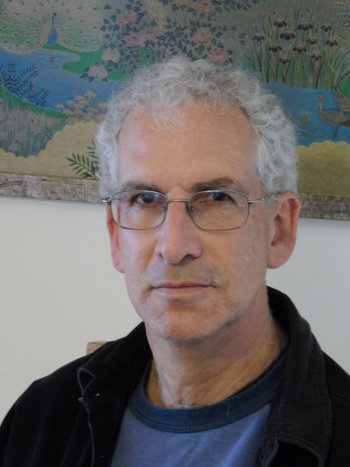Home > Oasis of Peace > Community > People pages > Bob Mark in Educational Conference
Bob Mark in Educational Conference
Friday 22 April 2016

On March 31, 2016, WAS-NS resident and former teacher at the WAS-NS binational primary school, Dr. Bob Mark was invited to speak on a panel in the Second Annual Symposium of the Israel Comparative Education Society at Bar Ilan University.
The panel was titled "Arab-Jewish bilingual education in Israel: implications for advancing social change through education in conflict-ridden areas" Bob’s talk was titled: "On locating the culture in multicultural education." It examined classroom practice and its implications for the goals of an Arab-Jewish school. The talk addressed points from his doctoral dissertation which examined questions he had originally identified through his experience as a teacher at the WAS-NS school.
The conference program is attached (in Hebrew). The panel on which Bob spoke was the only one conducted in English in order to enable the guest speaker, Prof Carlos Alberto Torres, to follow it without need for translation. Prof. Torres (UCLA) is President of the World Council of Comparative Education Societies and director of the Paulo Freire Institute.
An extract from the panel abstract appears below.
Arab-Jewish bilingual education in Israel: implications for advancing social change through education in conflict-ridden areas
Panel
Chairperson and respondent: Dr. Zvi Bekerman - Hebrew University
Speakers:
Dr. Merav Ben Nun - Oranim Academic College and Hand in Hand organization
Dr. Assaf Meshulam - Ben Gurion University
Dr. Bob Mark - Wahat al-Salam/Neve Shalom
Integrated Arab-Jewish bilingual schools may not be a major force in the Israeli education system, however it has become difficult to ignore the challenges that they present to commonly-held perceptions of what Jews and Arabs can and cannot do together. This panel examines Arab-Jewish bilingual education in light of attempts elsewhere in the world to advance social and political change through multicultural educational work. This turns the speakers’ attention towards aspects of Arab-Jewish education, both in the classroom and outside of the school, that have yet to be addressed by literature in the field.
Merav Ben Nun will discuss the influence of Arab-Jewish education on the school community and its implications for the construction of a shared society. Assaf Meshulam looks at parents’ motivation in sending their children to bilingual schools in Israeli and North American contexts. Bob Mark examines classroom practice and its implications for the goals of an Arab-Jewish school. Zvi Bekerman, who has conducted the most extensive research on Arab-Jewish bilingual education, will tie the presentations together as chairperson and respondent.
On locating the culture in multicultural education
Bob Mark
The research presented here is a qualitative study of a sixth-grade class in a Jewish-Arab bilingual school in Israel, focusing attention on the way in which lesson structure and classroom practice may serve to position Jewish and Arab children differently in the school. Lessons were conducted in either "binational" or "uni-national" forums enabling us to see how the same children responded to different learning contexts. The lessons were filmed, transcribed and coded, followed by semi-structured interviews with the teachers. The data revealed a more eye-level, discussion-based classroom discourse in Hebrew as opposed to a more hierarchical, frontal and closed question classroom discourse in Arabic. Differential teacher expectations were expressed implicitly in the nature of the work with the Jewish and Arab groups and they were often expressed explicitly in the interviews that followed. However expectations were not a topic that had been identified and broached in staff meetings or on any institutional level of the school.
The research connects the challenges of the Jewish-Arab schools to those of multicultural projects dealing with social inequality anywhere. It calls upon practitioners to turn their attention towards culture as it is shaped through interaction. The regard for cultures as communities of practice may lead teachers to a more critical approach towards multiculturalism based on examination of ways in which social inequality, institutional structures, cultural assumptions and discursive practices create groups in the classroom and influence the participants’ images of themselves and of the other.